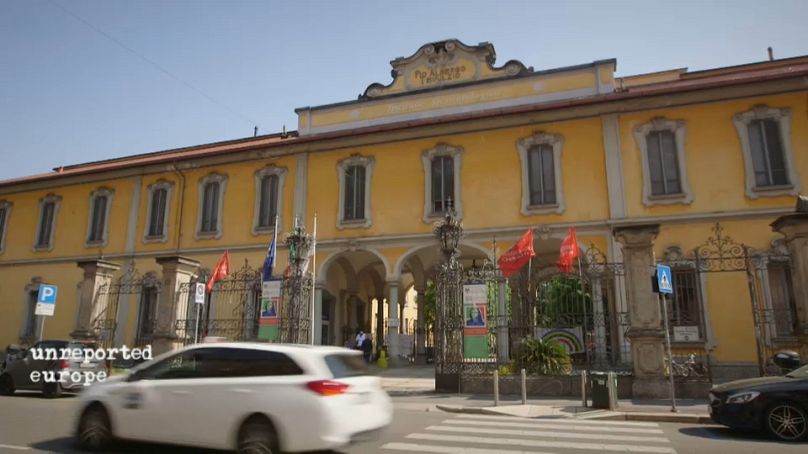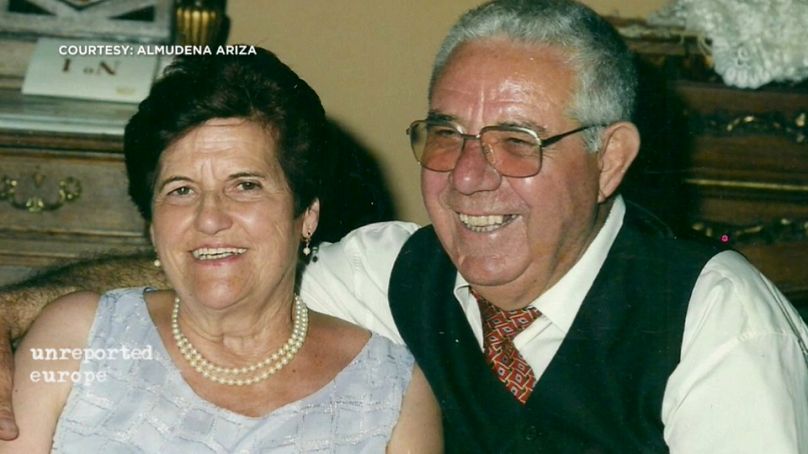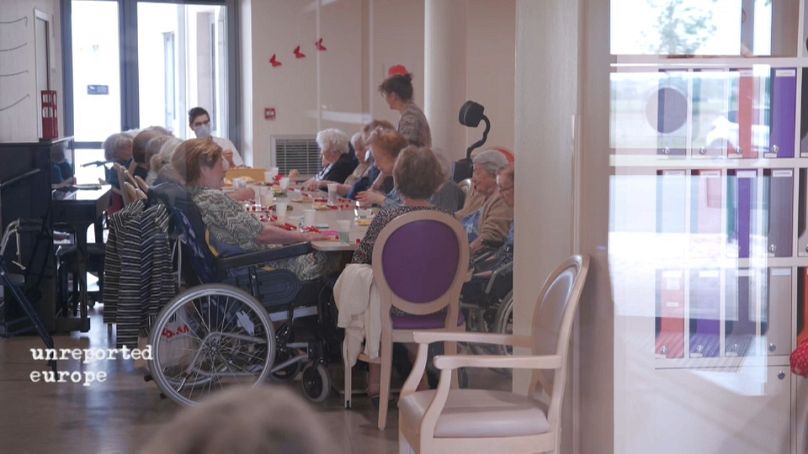In this episode of Unreported Europe Euronews' Valérie Gauriat explores the devastating impact of the coronavirus on the continent's care home sector.
The coronavirus has swept through Europe's care homes killing thousands of residents. According to one recent study, on average the number of deaths account for half of the total victims. Speaking to families, care workers and associations, in this episode of Unreported Europe Euronews' Valérie Gauriat investigates some of the best and worst practice.
"Over the past four days, every shift that I've been on, we've lost somebody, unfortunately."
Anne Clark, carer.
Italy's silent massacre
Pietro La Grassa works in the pharmacy of the Pio Albergo Trivulzio care home, one of the biggest in Europe. Located in the northern Italian city of Milan, like the Lombardy capital, the home was hit hard by the virus. Since the start of the country's health emergency more than 200 of its one thousand residents there have died. A criminal investigation is underway.
A trade union activist, Pietro believes many lives could have been saved if safety measures had been put in place weeks earlier.
“At the beginning of March, some employees took the initiative to put on masks. They were reprimanded and forced to remove them, on the pretext they were frightening the patients," explains Pietro. He adds: "The region needed to free up hospital beds, in order to prepare for what might happen with COVID, so it assigned patients to care homes. Unfortunately, there were no checks in these nursing homes!"
More than a quarter of the home’s 1000 strong work force, contracted the virus. Understaffed, the teams say they are exhausted and disillusioned.
"For those of us who are still working among those people, no tests whatsoever were done. And they continue to move us from one unit to another as if nothing has happened," says nurse Nadia Mordini.
"I had to put them in bags"
Italy is not alone. Many care workers throughout Europe have raised the alarm claiming the alleged wrongdoings in the nursing and care home sector are widespread.
For one Spanish care assistant we spoke to, the situation has become all too much.
"The dead... I had to put them in bags. I had to stretch them out because they died shrivelled up like this, I witnessed this. I had to close their eyes. I had to take them down to the morgue. And when the morgue was full, I took them to the underground car park," explains David Pérez Rivera.
Like many, he also believes the deaths were avoidable.
"If an isolation unit had been opened at the start, where anyone who showed symptoms could have been transferred, and the other residents had been left in their rooms, and if all the carers had had the protective equipment, which were not delivered to them for 2 weeks, I can assure you that the spread of the virus in the home would not have occurred!"
As in the case of Italy, Spain has also suffered greatly at the hands of the virus. That has inevitably led to questions over the authorities handling of the pandemic. Almudena Ariza's parents lived together in a retirement home. The couple died just days apart. Their children blame a lack of medical care for the deaths, saying their parents died under sedation, after their condition suddenly got worse.
"It's very hard, very difficult to imagine them like that, alone, or maybe together? Maybe blaming each other? says Almudena. "How can I know?... I don't know. Neither my father nor my mother deserved to die this way. They were not allowed a place in a hospital, or a ventilator because they were 86 years old. For us, it just feels like they were completely abandoned. Our elderly are literally being abandoned."
"Billions in profit"
Europe’s care home sector is concentrated in the hands of a few large private groups, often run by pension and investment funds. Eileen Chubb is the founder and Director of Compassion in Care, an organisation which seeks to improve conditions in the UK's care homes. Claiming the lucrative industry puts profits before safety, the former care worker turned whistleblower has long campaigned to highlight wrongdoings in the industry. Since the start of the COVID-19 outbreak, her helpline has received dozens of complaints from care home workers, whom she says feel they've been let down by their companies.
"There's too many care companies that are quite willing to fill beds and they don't mind at what cost. And because care home staff are running on a wing and a prayer with staffing ratios, it doesn't take much to tip this over the edge, she insists, adding: "These companies have made billions in profit, and then we've got a situation where they're saying they couldn't have foreseen this crisis and bought protective equipment for their staff. It is outrageous!"
"_Seventy-five percent of residents, and 51 percent of staff, were _COVID positive"
The lack of resources in many nursing homes in Europe has led, in some countries to the army being drafted in. At La Providence Saint Christophe care home in Belgium, the army had to be deployed after 17 out of 128 residents died during the first few weeks of the crisis.
“At the start we didn’t have the necessary protection. We tested everyone in the home on April 7 and it turned out that seventy-five percent of residents, and 51 percent of staff, were COVID positive. So we called in the military, because we didn't have enough staff left to take care of the residents," the home's Director Patrick Smousse said.
Hope in the face of despair
Despite the wave of deaths, in a rare number of cases, some retirement homes have managed to stem the deadly tide. The Vilanova Care Home near the city of Lyon in south east France is one example.
"For several weeks, the director of this care home and a large part of the employees decided to totally isolate themselves, day and night, with the residents. The result, no one has been contaminated so far. In order not to jeopardise that, we film everything through windows." explains Valérie Gauriat, Euronews International Reporter
On March 18, more than half of the staff in Vilanova, moved into the home bringing their suitcases and sleeping bags. Rallying around their director, they were determined to save the 106 residents.
"Our residents are not isolated to their rooms," says director Valérie Martin. "They are still able to have social contact with the other residents, as well as with us, as we see them all the time. They don't have the feeling of being abandoned or loneliness."
“Everyone is really lovely. They're a bit like family for me. I see the workers going back and forth, they come to say hello, then they go to do whatever they have to. It makes me really happy!" one resident tells us.
Despite the personal cost, the care staff agree that the huge effort has been worth it.
"I have a 10-month-old son. So of course, he is at home and obviously he is changing, and I'm missing a lot of that. But for me it made sense to stay isolated here. To protect the residents, and to protect my family as well," one employee says.
The home’s director Valérie Martin believes lessons must be learned from a health crisis that has had a devastating impact on the care sector.
"It's taken a global catastrophe for people to realise what's really going on in nursing homes. And that is a lack of means, a lack of funds, a lack of staff, and a lack of recognition of our trade. And really now, money must be made available, and directed towards the old. The elderly are not a burden, they are our memory. So we have to love them, and be there for them. And above all, we need to make sure that they have a tender and pleasant life until the end," she says.
After a total of 7 weeks of isolation, all the staff were tested for coronavirus: nobody was positive.













